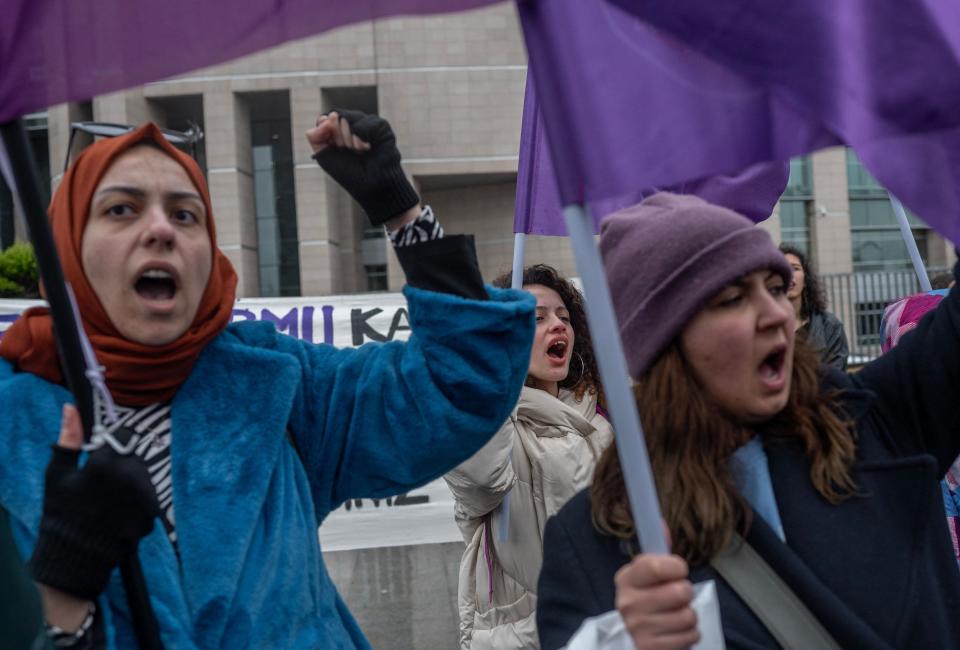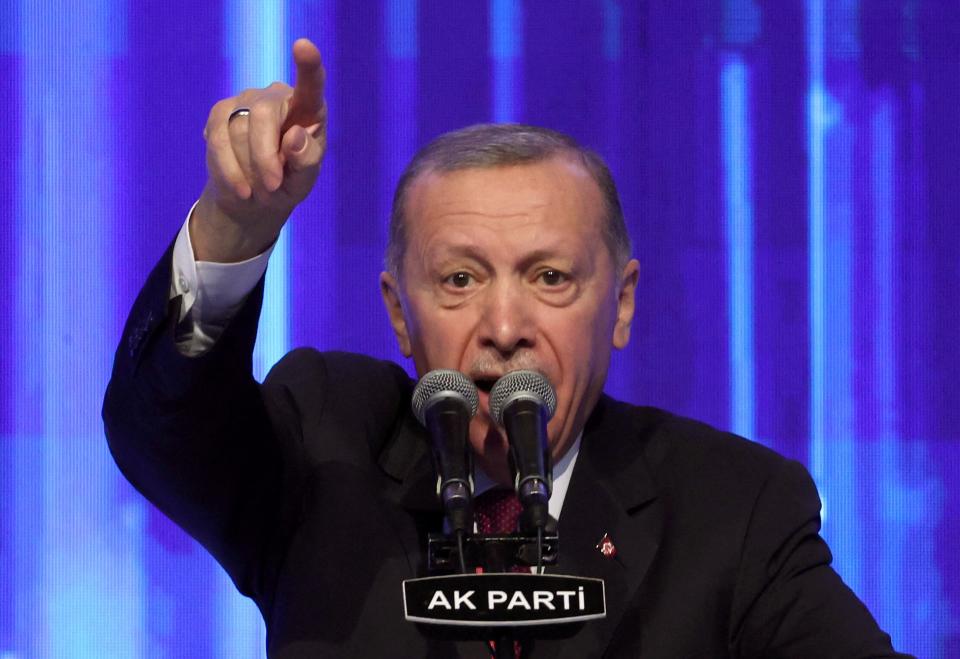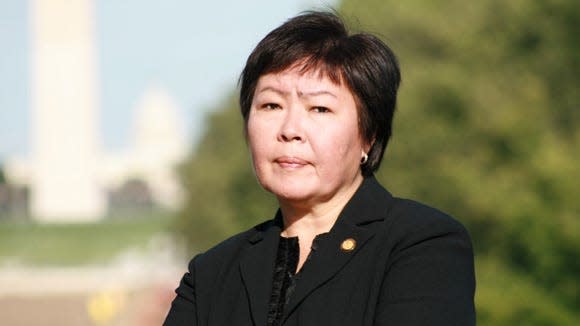As Muslims celebrate Eid al-Fitr ending Ramadan, we have a duty to examine women's rights
- Oops!Something went wrong.Please try again later.
Throughout Islamic countries, governments have a history of hijacking beliefs found in the Quran around women’s rights and independence, reimagining them into something oppressive and, quite frankly, scary.
As the Muslim world embraces this weekend's special period of reflection during Eid al-Fitr, which ends the holy fasting month of Ramadan, we have a responsibility to critically examine how women’s rights have advanced and receded around the world. Turkey, which is holding a high-stakes presidential election next month, used to be regarded as a model of tolerance and secularism to be emulated by other countries. Not so much today.
After 20 years of creeping authoritarianism under President Recep Tayyip Erdogan, women’s rights are again under attack, and the upcoming election could represent a last chance to change course before it’s too late.
Opinions in your inbox: Get exclusive access to our columnists and the best of our columns
Why do Muslims fast during Ramadan?: To learn what we can do without – and what we can share
Founding of Turkish Republic held birth of gender equality
This is a great pity, considering the gains that have been lost. Turkey has a long tradition of promoting gender equality and women’s rights, dating back a century to the foundation of the Turkish Republic. Women have been able to vote and hold political office since the 1930s, while the secularist tradition has allowed millions to obtain access to higher education and professional employment.
But the arrows aren’t pointing up anymore. In 2006, Turkey was ranked 105th in the World Economic Forum Global Gender Gap survey.
By last year, Turkey had fallen to 124th, closing in on Saudi Arabia, ranked 127th out of 146 nations.

In 2010, at a conference of women’s organizations, then-Prime Minister Erdogan said in a speech that he did not believe in the equality of men and women, and that women’s destinies were divinely ordained. This was followed by a change in the name of the Ministry for Women and Families to the Ministry of Family and Social Policy, de-emphasizing the rights of women and limiting the special attention they had, as a group.
Furthermore, the language that Erdogan’s party and government have used when talking about women’s issues has only increasingly served to reinforce the idea that they believe women have a specific role to play in society and this role is secondary to that of men. Erdogan has emphasized the “duty” women have as procreators, offensively calling on every woman to have "at least" three children, and insisting that this is more important than any other role women can play in Turkish society.
Iran's Gen Z is fed up: The protests aren't just about hijab, they're about regime change
'I am scared': LGBTQ Ugandans already suffer imprisonment, torture. Now they could face the death penalty.
Though he has condemned violence against women, Erdogan has done so by saying that men are the “custodians” of women and should be their protectors, implying that women could not come to their own defense.
Then, he seemed to make an about-face.
Convention on preventing and combating violence against women and domestic violence
In May 2011, the Council of Europe met in Istanbul to start the signing of the convention on preventing and combating violence against women and domestic violence, commonly known as the Istanbul Convention.
Erdogan took advantage of this momentous event and was the first government representative to sign and ratify the document. But now we know he was just playing politics.

A decade on, Turkey is the only country to have withdrawn from the Istanbul Convention, claiming it was “hijacked” by groups attempting to normalize values that were against Turkish society and tradition, and arguing that domestic laws were sufficient in protecting the rights of women in Turkey.
This position could not be further from the truth.
In the years that Erdogan's Justice and Development Party, or AKP, has been in power, the increase in violence against women has been notable and dramatic. Femicides, honor killings, sexual assault, child marriages – across every category, violence against women statistics have shown a marked increase.
I shot my abuser to escape: Why are so many domestic violence survivors like me in prison?
USA TODAY stands with Evan Gershkovich: Russia's arrest of WSJ reporter raises the stakes
And unfortunately, prosecutions and arrests for these crimes is an increasingly rare event, with numerous watchdog organizations blaming the AKP for failing to do enough to protect women.
It is clear that Erdogan's government no longer values Turkish women, and that new leadership is critical to not just women’s rights but civil rights of all.

Meral Aksener, the head of the Iyi Party and one of the longest serving women in government in Turkish history, has been calling for such change. Last December, she received a standing ovation by a stadium of women as she denounced femicide and toxic patriarchy, and promised to ensure that Erdogan and his government will have to “get used to women as political actors.”
Long urging a return to a parliamentary system, Aksener is the lone female in a male-dominated political landscape. She wields significant influence across a broad base of voters and is referred to as a “kingmaker” among the opposition alliance.
Her symbolism as a force for women’s rights could be an important driver for voters to come out on May 14 and end more than two decades of Erdogan and AKP rule.
Opinion alerts: Get columns from your favorite columnists + expert analysis on top issues, delivered straight to your device through the USA TODAY app. Don't have the app? Download it for free from your app store.
If the Turkish people wish to secure a government that is truly representative, the opposition must prevail against Erdogan and restore the Istanbul Convention. This would represent a clear signal that Turkey values and will protect the lives of women and girls throughout the country, and will uphold the republic's founding principles that endorsed and encouraged gender parity.
If not, inaction will lead to the further whittling away of women’s rights and send Turkish women back to the dark ages.

Zamira Sydykova is a journalist, democracy activist and former diplomat who served as the ambassador of Kyrgyzstan to the United States and Canada, 2005-10.
You can read diverse opinions from our Board of Contributors and other writers on the Opinion front page, on Twitter @usatodayopinion and in our daily Opinion newsletter. To respond to a column, submit a comment to letters@usatoday.com.
This article originally appeared on USA TODAY: As Ramadan ends, Muslims have duty to keep fighting for women's rights

